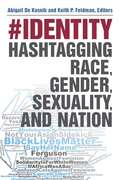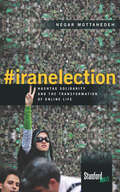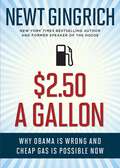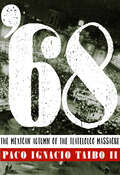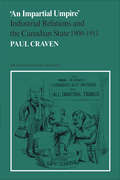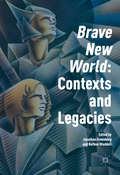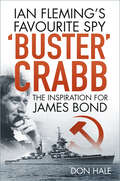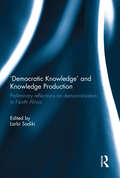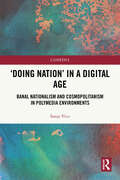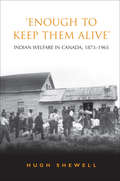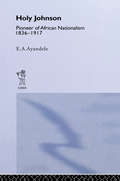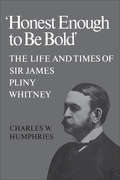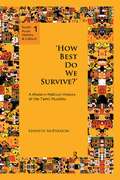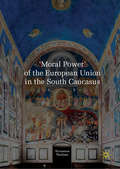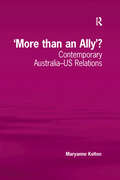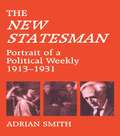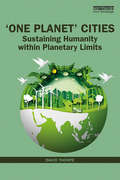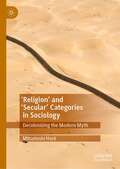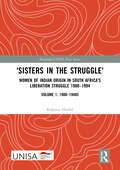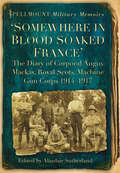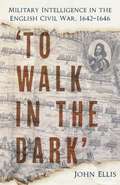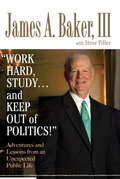- Table View
- List View
#identity: Hashtagging Race, Gender, Sexuality, and Nation
by Abigail De Kosnik Keith FeldmanSince its launch in 2006, Twitter has served as a major platform for political performance, social justice activism, and large-scale public debates over race, ethnicity, gender, sexuality, and nationality. It has empowered minoritarian groups to organize protests, articulate often-underrepresented perspectives, and form community. It has also spread hashtags that have been used to bully and silence women, people of color, and LGBTQ people. #identity is among the first scholarly books to address the positive and negative effects of Twitter on our contemporary world. Hailing from diverse scholarly fields, all contributors are affiliated with The Color of New Media, a scholarly collective based at the University of California, Berkeley. The Color of New Media explores the intersections of new media studies, critical race theory, gender and women’s studies, and postcolonial studies. The essays in #identity consider topics such as the social justice movements organized through #BlackLivesMatter, #Ferguson, and #SayHerName; the controversies around #WhyIStayed and #CancelColbert; Twitter use in India and Africa; the integration of hashtags such as #nohomo and #onfleek that have become part of everyday online vernacular; and other ways in which Twitter has been used by, for, and against women, people of color, LGBTQ, and Global South communities. Collectively, the essays in this volume offer a critically interdisciplinary view of how and why social media has been at the heart of US and global political discourse for over a decade.
#iranelection: Hashtag Solidarity and the Transformation of Online Life
by Negar MottahedehThe protests following Iran's fraudulent 2009 Presidential election took the world by storm. As the Green Revolution gained protestors in the Iranian streets, #iranelection became the first long-trending international hashtag. Texts, images, videos, audio recordings, and links connected protestors on the ground and netizens online, all simultaneously transmitting and living a shared international experience. #iranelection follows the protest movement, on the ground and online, to investigate how emerging social media platforms developed international solidarity. The 2009 protests in Iran were the first revolts to be catapulted onto the global stage by social media, just as the 1979 Iranian Revolution was agitated by cassette tapes. And as the world turned to social media platforms to understand the events on the ground, social media platforms also adapted and developed to accommodate this global activism. Provocative and eye-opening, #iranelection reveals the new online ecology of social protest and offers a prehistory, of sorts, of the uses of hashtags and trending topics, selfies and avatar activism, and citizen journalism and YouTube mashups.
$2.50 A Gallon: Why Obama Is Wrong and Cheap Gas Is Possible
by Newt GingrichNew York Times bestselling author, former Speaker of the House, and Fox News political analyst and Republican presidential candidate Newt Gingrich has a plan for slashing gas prices and reducing our long-term dependence on foreign oil.Gingrich is famous for taking big, visionary ideas and boiling them down into practical solutions for the American people and in his new book, $2.50 A Gallon: Why Obama Is Wrong and Cheap Gas Is Possible, Gingrich tackles America's energy crisis.Dealing not only with spiraling gas prices, but with all aspects of energy policy, Gingrich shows how we can safely reap the benefits of America's own natural resources and technology in gas, oil, coal, wind, solar, biofuels and nuclear energy.Gingrich argues that the pinch Americans are feeling at the pump is not a blip in the economy but a looming crisis--affecting not only the price of gas, but the price of food, the strength of our economy, and our national security.To meet this crisis, Gingrich lays out a national strategy that will tap America's scientists, engineers, and entrepreneurs, and require Congress to unlock our oil reserves and remove all the impediments and disincentives that unnecessary government regulation has put in the way of American energy independence.The energy crisis is solvable, as Newt Gingrich's plan makes clear. His handbook, $2.50 A Gallon: Why Obama Is Wrong and Cheap Gas Is Possible, is sure to become the talk of the presidential campaign season.
'68
by Paco Ignacio Taibo II Donald Nicholson-SmithOn the night of October 2, 1968, there occurred a bloody showdown between student demonstrators and the Mexican government in Tlatelolco Square. At least two hundred students were shot dead and many more were detained. Then the bodies were trucked out, the cobblestones were washed clean. Detainees were held without recourse until 1971. Official denial of the killing continues even today: In the first week of February 2003, Mexico's Education Secretary Reyes Tamiz ordered a new history textbook that mentions the massacre-Claudia Sierra's History of Mexico: An Analytical Approach-removed from shelves and classrooms. (Public outcry led Tamiz to reverse his decision days later.) No one has yet been held accountable for the official acts of savagery. With provocative, anecdotal, and analytical prose, Taibo claims for history "one more of the many unredeemed and sleepless ghosts that live in our lands."
'A Justifiable Obsession'
by Penny Bryden'A Justifiable Obsession' traces the evolution of Ontario's relationship with the federal government in the years following the Second World War. Through extensive archival research in both national and provincial sources, P.E. Bryden demonstrates that the province's successive Conservative governments played a crucial role in framing the national agenda - although this central relationship has received little attention compared to those that have been more volatile. As such, Bryden's study sheds light on an important but largely ignored chapter in Canadian political history.Bryden focuses on the politicians and strategists who guided the province through the negotiation of intergovernmental economic, social, and constitutional issues, including tax policies, the design of the new social welfare net, and efforts to patriate the constitution. Written in a lucid, engaging style that captures the spirit of the politics of postwar Canada, 'A Justifiable Obsession' is a significant contribution to our understanding of Ontario's politics and political culture.
'An Impartial Umpire': Industrial Relations and the Canadian State 1900-1911
by Paul CravenThis book is an insightful and detailed analysis of Canadian labour relations policy at the beginning of the 20th century, and of the formulation of distinctive features which still characterize it today. The development and reception of this policy are explained as a product of ideological and economic forces. These include the impact of international unionism on the Canadian working class, the emergence of scientific management in business ideology, and the special role of the state in economic development and the mediation of class relationships.The ideas and career of Mackenzie King, including his 'new liberalism,' and his activities in regard to the Department of Labour are examined, revealing how he moulded Canada's official position in the relations between capital and labour. With a focus on King's intellectual qualities in an international context, the author brings out another dimension, portraying him as Canada's first practising social scientist.The book examines implementation of policy through an analysis of the work of the Department of Labour through detailed case studies of government interventions in industrial disputes. The initial acceptance of the labour relations policy by the labour movement is explained and its repudiation in 1911 is examined against a background of setbacks which reflected its practical limits as much as its philosophical orientation. The result is a study which moves beyond a particular concern with labour policy to illuminate the contours of Canadian life in a crucial period of national development.
'Brave New World': Contexts and Legacies
by Jonathan Greenberg Nathan WaddellThis collection of essays provides new readings of Huxley's classic dystopian satire, Brave New World (1932). Leading international scholars consider from new angles the historical contexts in which the book was written and the cultural legacies in which it looms large. The volume affirms Huxley's prescient critiques of modernity and his continuing relevance to debates about political power, art, and the vexed relationship between nature and humankind. Individual chapters explore connections between Brave New World and the nature of utopia, the 1930s American Technocracy movement, education and social control, pleasure, reproduction, futurology, inter-war periodical networks, motherhood, ethics and the Anthropocene, islands, and the moral life. The volume also includes a 'Foreword' written by David Bradshaw, one of the world's top Huxley scholars. Timely and consistently illuminating, this collection is essential reading for students, critics, and Huxley enthusiasts alike.
'Buster' Crabb: Ian Fleming’s Favourite Spy, The Inspiration for James Bond
by Don HaleLIONEL ‘BUSTER’ CRABB was a drinker, a gambler, a womaniser and a lover of fast cars and gadgets. On top of all that, he was a spy, an acquaintance of Ian Fleming and the inspiration for James Bond.A British naval frogman and bomb disposal expert, Crabb worked directly under Fleming during the Second World War at Naval Intelligence and went on to conduct covert operations for both SIS and MI5. Elements from Crabb’s dangerous missions and eccentric lifestyle were later incorporated into Fleming’s novels. His inventions sparked the role of Q; Miss Moneypenny was based on Crabb’s aunt, Kitty Jarvis; and his underwater battle with enemy divers became a crucial scene in Thunderball. During a secret drive beneath a Russian warship in 1957, Crabb disappeared without a trace. One year later, a decapitated and handless body was found, sparking a major row between the government, the secret services and the Admiralty that still smoulders today.
'Democratic Knowledge' and Knowledge Production: Preliminary Reflections on Democratisation in North Africa
by Larbi SadikiSudden change in North Africa manifested through popular protests followed by the end of authoritarian regimes in Tunisia, Egypt and Libya revitalised the scholarly concern with democracy in the region. Democratisation and democracy received fresh attention in the ‘Arab Spring’. Arab citizens displayed their grasp and possession of ‘democratic knowledge’ in a bottom-up groundswell of activism against the wielding of power by authoritarian regimes. In this book, the investigation into democratic knowledge revolves around the idea that good government must be in the first instance rooted in a local system of knowledge. However, no privileging of the ‘local’ is offered here at the expense of the ‘democratic’. Each chapter illustrates the context-specific experiences which provide political actors with the wherewithal in actively learning democracy. The countries examined with reference to a socially constructed democratic knowledge include Algeria, Libya, Morocco, Tunisia and Egypt. Critical focus on local agency in North Africa during the ‘Arab Spring’ enables a shift from democratisation as an ideology to a ‘democratic learning turn’. This book was originally published as a special issue of the Journal of North African Studies.
'Doing Nation' in a Digital Age: Banal Nationalism and Cosmopolitanism in Polymedia Environments (Comedia)
by Sanja VicoThis book introduces a new theory of national identity, arguing that the nation does not only represent an abstract “imagined community” but also represents embodied cultural and discursive practices.Drawing upon a detailed case study of Serbian Londoners, this truly interdisciplinary study positions media as constitutive of national identities. The author contends that nations come into being and are sustained through everyday interpersonal communication practices that have increasingly become mediated, especially for migrants. She develops the concept of "doing nation" to argue that we should think of the nation as a dynamic process. Situated first within a particular migration context, the concept is then applied more broadly as everyday communication practices are becoming increasingly mediated worldwide.Covering a breadth of key theories and concepts in this field, including diaspora, ethnicity, nationalism, cosmopolitanism, social media affordances and polymedia, this book will appeal to scholars and students researching digital media, migration, identities, nationalism and cosmopolitanism in the social science disciplines.
'Enough to Keep Them Alive'
by Hugh E.Q. ShewellFar from being a measure of progress or humanitarian aid, Indian welfare policy in Canada was used deliberately to oppress and marginalize First Nations peoples and to foster their assimilation into the dominant society. 'Enough to Keep Them Alive' explores the history of the development and administration of social assistance policies on Indian reserves in Canada from confederation to the modern period, demonstrating a continuity of policy with roots in the pre-confederation practices of fur trading companies.Extensive archival evidence from the Indian Affairs record group at the National Archives of Canada is supplemented for the post-World War Two era by interviews with some of the key federal players. More than just an historical narrative, the book presents a critical analysis with a clear theoretical focus drawing on colonial and post-colonial theory, social theory, and critiques of liberalism and liberal democracy.
'Hind Swaraj' and Other Writings
by Mahatma Gandhi Anthony J. ParelHind Swaraj is Mahatma Gandhi's fundamental work. Not only is it key to understanding his life and thoughts, but also the politics of South Asia in the first half of the twentieth century. Celebrating 100 years since Hind Swaraj was first published in a newspaper, this centenary edition includes a new Preface and Editor's Introduction, as well as a new chapter on 'Gandhi and the 'Four Canonical Aims of Life''. The volume presents a critical edition of the 1910 text of Hind Swaraj, fully annotated and including Gandhi's own Preface and Foreword (not found in other editions). Anthony J. Parel sets the work in its historical and political contexts and analyses the significance of Gandhi's experiences in England and South Africa. The second part of the volume contains some of Gandhi's other writings, including his correspondence with Tolstoy and Nehru.
'Holy' Johnson, Pioneer of African Nationalism, 1836-1917
by E.A. AyandeleA biography of one of the great 19th-century Africans and an insightful analysis of one of the earlier phases of African nationalism.
'Honest Enough to Be Bold': The Life and Times of Sir James Pliny Whitney
by Charles HumphriesOn a promise of 'Clean, Uncorrupt, and Incorruptible Government,' James Pliny Whitney marked the end of an era of Liberal rule that had lasted for over three decades, and introduced to the province a new, 'progressive' brand of conservatism. As this lively biography demonstrates, Whitney was a gruff and forceful leader. He had a keen understanding of the social and technological forces that were changing Ontario so dramatically in the early twentieth century; he also understood, better than the Liberals, the political implications of those forces. The policies of his government extended to hydroelectric power, bilingual schools, northern development, automobile regulation, temperance (he dealt with the advocates of prohibition 'through gritted teeth'), imperial unity, housing, workmen's compensation, and the suffrage movement. (In a lapse from progressiveness, he argued that women should not be exposed to 'the unlovely influence of party politics.') He had a lasting influence on higher education in the province through the establishment of a Board of Governors for the University of Toronto, then unmistakably the provincial university of Ontario, and the provision of tenure for its full professors. Whitney liked to describe himself as 'bold enough to be honest ... honest enough to be bold.' Humphries concludes that as premier from 1905 to 1914 Whitney lived up to his self-description. The boldness of his legislative programs recognized the evolution of a new industrial society and paved the way for government to intervene in economic and social affairs. The success of his progressive conservatism laid the foundation for decades of Tory success in Ontario.
'How Best Do We Survive?': A Modern Political History of the Tamil Muslims (South Asian History and Culture)
by Kenneth McPhersonThis book traces the social and political history of the Muslims of south India from the later nineteenth century to Independence in 1947, and the contours that followed. It describes a community in search of political survival amidst an ever-changing climate, and the fluctuating fortunes it had in dealing with the rise of Indian nationalism, the local political nuances of that rise, and its own changing position as part of the wider Muslim community in India. The book argues that Partition and the foundation of Pakistan in 1947 were neither the goal nor the necessarily inescapable result of the growth of communal politics and sentiment, and analyses the post-1947 constructions of events leading to Partition. Neither the fact of Muslim communalism per se before 1947 nor the existence of separate Muslim electorates provide an explanation for Pakistan. The book advances the theory that micro-level studies of the operation of the former, and the defence of the latter, in British India can lead to a better understanding of the origins of communalism. The book makes an important contribution to understanding and dealing with the complexities of communalism — be it Hindu, Muslim or Christian — and its often tragic consequences.
'I Wish I Had Your Wings': A Spitfire Pilot and Operation Pedestal, Malta 1942
by Angus MansfieldIn August 1942, British launched Operation Pedestal in an attempt to deliver supplies to the stricken island of Malta, an Allied base which had been under Axis blockade for months. From 9–15 August a convoy of some 50 ships ran the gauntlet of Axis bombers, submarines, E-boats and minefields. Of the original fourteen merchant vessels, only five reached Malta Grand Harbour. In 'I Wish I Had Your Wings', Angus Mansfield relates the experiences of two men involved in Pedestal, Captain David Macfarlane of MV Melbourne Star and his nephew David Mejor, one of the Spitfire pilots who fought to protect the convoy. Told using their log books, letters and papers, this is the story of one family’s contribution to a relief operation that cost over 400 Allied lives, but which has gone down in history as one of the most important British strategic victories of the Second World War.
'Moral Power' of the European Union in the South Caucasus
by Syuzanna VasilyanThis book devises a new conceptual framework of ‘moral power’ and applies it to the policy of the European Union (EU) towards the South Caucasian states of Armenia, Azerbaijan and Georgia. It covers the period starting from the 1990s to the present and analyses policy domains (democracy promotion, conflict resolution, security, energy, trade) juxtaposing the policy of EU/member states with those of the United States (US), Russia, Turkey, Iran, as well as inter-governmental and regional organizations. ‘Morality’ is unpacked as composed of seven parameters: consequentialism; coherence; consistency; normative solidity; balance between values and interests; inclusiveness; and external legitimacy. ‘Power’ is branched into ‘potential’, ‘actual’ and ‘actualized’ types. ‘Moral power’ is consequently developed as an objective and neutral framework to capture the foreign policy of an international actor in any geographic area and policy sphere. The book will be useful for students and scholars of International Relations and EU Studies, policy-makers and practitioners.
'More than an Ally'?: Contemporary Australia-US Relations
by Maryanne KeltonWith the ascendancy of the Coalition government in 1996 there was a marked shift of emphasis directed to deepening Australia's relations with America. The Coalition government strategically linked security and economic well-being and this linking was contextualized by threats both internal and external. By deepening the relationship of the US alliance in foreign, trade and defence policies, the Australian government sought to resonate on inherited and conservative perceptions of threat in the domestic environment. Maryanne Kelton introduces specific cases to demonstrate both the intensity and complexity of dealing with the US. Through these empirical studies the government's approach is examined across trade, security and industry sectors. The book adds to the current debate as it provides an explanatory framework for understanding the Australian government's choices in its relations with the USA across the broader spectrum of security issues.
'New Statesman': Portrait of a Political Weekly 1913-1931
by Adrian SmithThis volume reveals how a fledgling Fabian journal came to play a key role in the growth of the modern Labour Party. The author compares its first journalists with later generations of editors and writers and rediscovers the early, and lasting, importance of the British Left's best-known magazine.
'One Planet' Cities: Sustaining Humanity within Planetary Limits
by David ThorpeThis book addresses the crucial question of how the essential needs of the growing human population can be met without breaking the Earth's already-stretched life-support system. With four out of five people predicted to be urban dwellers by 2080, ‘One Planet’ Cities proposes a pathway to genuine sustainability for cities and neighbourhoods, using an approach based on contraction and convergence. Utilising interviews with key players, including the Global Footprint Network, World Future Council, WWF, mayors and government officials, and case studies from across the globe, including Europe, North and South America, Australia, South Africa, China and India, David Thorpe examines all aspects of modern society from food provision to neighbourhood design, via industry, the circular economy, energy and transport through the critical lens of the ecological footprint and relevant supporting international standards and indicators. Recommendations on managing supply chains and impacts, how the transition to a world within limits might be financed, and a deep examination of the Welsh Government's pioneering efforts follow. It concludes with an imagined vision of what a genuinely sustainable future might be like, and an appeal for 'one planeteers' everywhere to step up to the challenge. This book will be of great interest to practitioners and policymakers involved in governance, administration, urban environments and sustainability, alongside students of the built environment, urban planning, environmental policy and energy.
'Religion’ and ‘Secular’ Categories in Sociology: Decolonizing the Modern Myth
by Mitsutoshi HoriiInformed by ‘critical religion’ perspective in Religious Studies and postcolonial self-reflection in Sociology, this book interrogates the ideas of ‘religion’ and ‘the secular’ in social theory and Sociology. It argues that as long as social theory and sociological discourse embed the religion-secular distinction and locate themselves on the ‘secular’ side of the binary, Sociology will continue to serve the very ideologies it tries to subvert – namely Western modernity/coloniality.
'Sisters in the Struggle': Women of Indian Origin in South Africa's Liberation Struggle 1900–1994 (VOLUME 1: 1900–1940s) (Routledge/UNISA Press Series)
by Kalpana Hiralal‘Sisters in the struggle’: Women of Indian Origin in South Africa’s Liberation Struggle 1900–1994 unveils an unchartered historical terrain, highlighting the contributions of Indian women towards non-racialism and equality and their experiences within diverse political parties; therefore, shifting the post-apartheid liberation stories which have been dominated by the journey of the ANC to other political organisations who collectively played a significant role in South Africa’s road to democracy. In this book, Hiralal presents a refreshing perspective of Indians, particularly women, as contributors and activists in the struggle. The book elucidates that the struggle against apartheid was a collective endeavour among the oppressed races and not a one-sided endeavour by the ANC. The book, thus, examines the participation of Indian women against apartheid and colonialism within gendered and political frameworks.
'Somewhere in Blood Soaked France': The Diary of Corporal Angus Mackay, Royal Scots, Machine Gun Corps, 1914-1917 (Spellmount Military Memoirs)
by Alasdair SutherlandFrom the heat and dust of the Dardanelles to the mud of the Western Front, Corporal Angus Mackay had one constant companion, his diary. He wrote of the battles and campaigns he fought in, names that would go down in history: Gallipoli, the Somme, Ypres and Arras. Serving in the the 1st/5th Battalion (Queens Edinburgh Rifles) Royal Scots and later the 88th Brigade Machine Gun Corps, he left a record of one man's extraordinary and tragic war. In Somewhere in Blood Soaked France, Alasdair Sutherland reveals this previously unpublished account of the First World War, complete with historical context, orders of battle and extracts from official war diaries. This rare source - it was an offence to keep a record in a case of capture - offers a stirring insight into the bravery of Mackay and his companions, who were not afraid to die for their country. 'If I go under it will be in a good cause, so roll on the adventure.'
'To Walk in the Dark': Military Intelligence in the English Civil War, 1642-1646
by John EllisDuring the bloody years of the First English Civil War, as the battles of Edgehill, Newbury and Naseby raged, another war was being fought. Its combatants fought with cunning and deceit, a hidden conflict that nevertheless would steer the course of history. The story of the spies and intelligence-gatherers of the Roundheads and Royalists is one that sheds new light on the birth of the Commonwealth. In 'To Walk in the Dark', intelligence specialist John Ellis presents the first comprehensive analysis of the First English Civil War intelligence services. He details the methods of the Roundhead spies who provided their army commanders with a constant flow of information about the movements of the King's armies, describes the earliest use of code-breaking and mail interception and shows how the Cavalier intelligence forces were overcome. He also reveals the intelligence personnel themselves: the shadowy spymasters, agents and femmes fatales. The descriptions of how intelligence information was used in the main Civil War battles are particularly fascinating and show - for the first time - how intelligence information played a decisive role in determining the outcome of the Civil War itself.
'Work Hard, Study...and Keep Out of Politics!': Adventures and Lessons from an Unexpected Public Life
by James Robert BakerThe real inside story of why Gerald Ford did not ask Ronald Reagan to be his running mate in 1976-and why Reagan did not pick Ford in 1980; the battle over Florida 2000; the aborted White House job switch that inadvertently opened the door to the Iran-Contra scandal; the Bush campaign's wish that Dan Quayle would offer to resign from the ticket in 1992; the White House turmoil in the dark days following the Reagan assassination attempt; and a great deal more . . . White House Chief of Staff (twice), Secretary of State, Secretary of the Treasury, and campaign chairman for three different candidates in five successive presidential campaigns-few people have lived and breathed politics as deeply as James Baker. Now, with candor and Texas-style storytelling, and not a few surprises, he takes us into his thirty-five years behind the scenes. None of it was planned. His grandfather, the "Captain," drilled this advice into him: "Work hard, study . . . and keep out of politics!" Then a personal tragedy changed the life of a forty-year-old Texas Democratic lawyer and he never looked back. From campaign horsetrading, which sometimes got rough ("Politics ain't beanbag," says Baker), to the inner councils of the Reagan and Bush administrations to the controversies of today, Baker offers frank talk and spellbinding narratives, along with personal appraisals of six presidents and a constellation of others. It was a long, unexpected journey from Houston, Texas, to Washington, D.C.-and you'll want to travel it with him.
